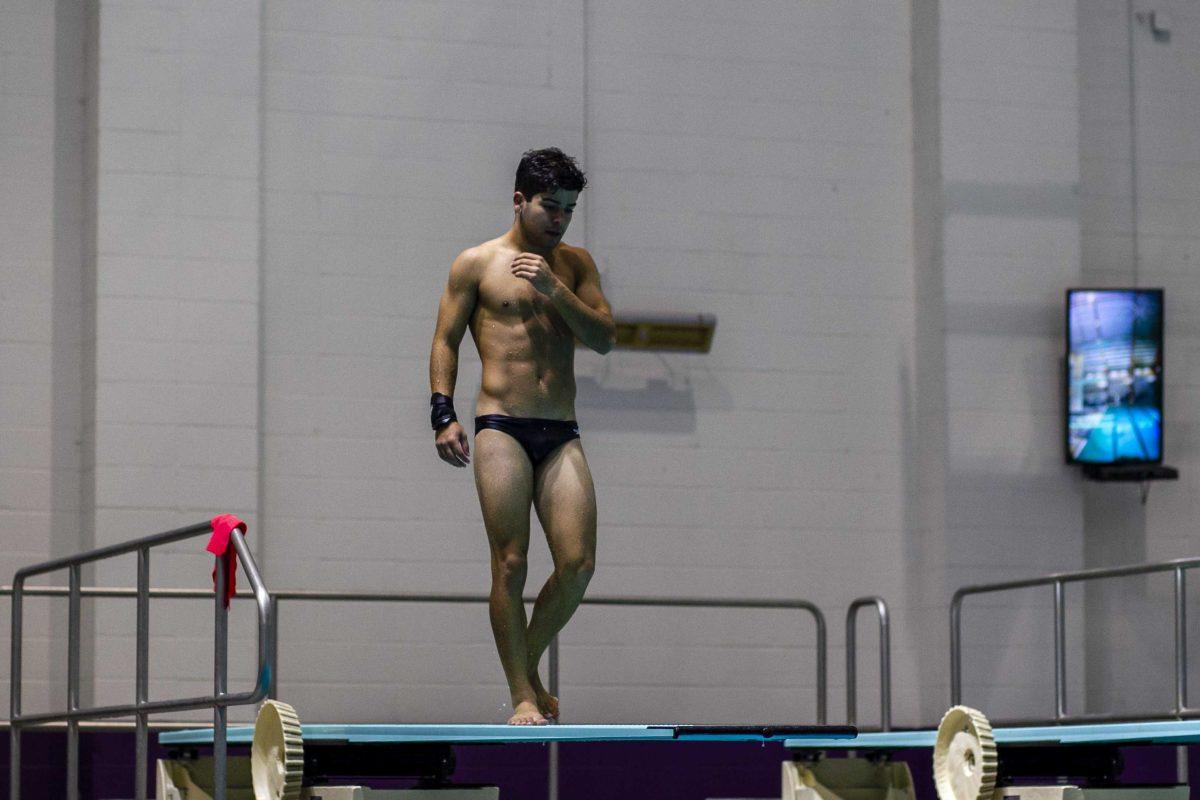Freshman diver Manny Vazquez Bas sat in the LSU Natatorium’s press box as Hurricane Dorian scraped the East Coast of the United States after devastating the Bahamas, largely sparing his home of San Juan, Puerto Rico.
As he recalled Hurricane Maria, which made landfall two years ago on Sept. 16, 2017, Vazquez Bas’ bright smile and positive aura momentarily subsided, clouded by a brief tinge of sadness. A couple of months before Maria, Vazquez Bas took his talents to Orlando, seeking upgraded training, facilities and exposure. His family stayed in San Juan.
“It was hard,” Vazquez Bas said. “I wasn’t sure what happened. It was probably three days after the hurricane [and] I still wasn’t in contact with my parents. I couldn’t travel there. All I was hearing was the news that the hurricane destroyed thousands of houses.”
His normal composure quickly returned.
“For the most part I was pretty comfortable,” Vazquez Bas said. “I knew that my parents would be fine.”
Vazquez Bas’ family survived the storm. His father, Carlos Quinones, a federal employee, kept his job, but his mother, Liza, was out of work for a year. Vazquez Bas’ grandfather is a sailor, and Maria sunk his boat. Although his house’s concrete structure withstood the impact, it was without electricity for four months, forcing the family to spend thousands of dollars on generator fuel on top of Vazquez Bas’ living expenses in Orlando.
Still, the Vazquez Bas family emerged from the storm in relatively fortunate circumstances. Maria claimed a staggering 3,000 lives and caused $90 billion in damage. Power wouldn’t be fully restored to the island until 11 months after the storm.
And it nearly took Vazquez Bas’ livelihood.
“Maria was going to be the end of my career,” Vasquez Bas said. “There was no pool [after the storm] for me to train [in]. There was nothing. It was just surviving.”
FEMA came under fire for its delayed arrival in Puerto Rico as the death toll climbed in the absence of electricity. Maria still haunts Vazquez Bas, and he is grateful that he could focus on diving, not surviving, during his home’s long, painful recovery. He signed with LSU in November 2018, a few months after the power was restored in Puerto Rico.
When the school year started in Baton Rouge, Vazquez Bas found himself in a similar situation. Tropical Storm Dorian threatened Puerto Rico in what could have been the first major test of the power grid since Maria. Vazquez Bas was in another new environment, even farther from his family this time.
Vazquez Bas admitted to being scared and concerned, but he remained calm as Dorian moved through the Gulf of Mexico. He wasn’t too worried once he realized it wasn’t going straight through the middle of the island like Maria did.
Dorian then strengthened to a Category 5 storm with his second home of Orlando in its path.
Vazquez Bas said he spoke to a few friends, all of whom “were pretty chill.”
“I’ve been in hurricanes my whole life. It’s a normal thing that happens,” he said.
On the diving platforms, in interviews and in the face of hurricanes, Vazquez Bas is poised. He has honed the mental side of diving, crucial for any diver determined to reach the highest levels of competition.
Diving is “more mental than physical,” according to Elizabeth Cui, a former Olympian and LSU diver.
“One of the most basic and most common fears everyone has is falling, and our sport is pretty much falling,” Cui said. “So naturally it’s very scary, and it goes against human nature. You’re trying to conquer that fear every day.”
When asked to describe how he has found peace of mind in a tense sport, Vazquez Bas exhaled: “It’s been a long process,” he said.
“[Diving] teaches you that not everything is going to be great and how to stay calm and not overreact and know how to think before reacting,” Vazquez Bas said.
“Everything is in your mind, and once you get that out, you’re going to be able to perform better.”
Vazquez Bas’ mental fortitude allowed him to block out past calamity in the face of potential disaster. It also brought him to the highest levels of diving in tournaments in Canada, Cuba and Columbia, ascending him through Orlando, to Baton Rouge and possibly to Tokyo for the 2020 Olympics.
“Diving has opened so many doors for me,” Vazquez Bas said. “It has brought me so many great experiences, and I’ve met so many people who have helped me grow as a person and as an athlete too.”
“If I didn’t have diving, I don’t even know where I’d be,” Vazquez Bas said.
If Vazquez Bas falls short of Tokyo, will he consider it a failure? His answer was predictably positive.
“Even if I don’t qualify, I won’t see it as failure,” Vazquez Bas said. “I would see it as an experience, as a learning lesson.”
Elizabeth Cui is a former LSU diver and current Reveille staff reporter.
‘Maria was going to be the end of my career’: LSU diver Manny Vazquez Bas and the storm that shaped him
By Reed Darcey
September 16, 2019
LSU freshman diver Manny Vazquez Bas practices a dive in the LSU Natatorium on Wednesday, Sept. 4, 2019.


